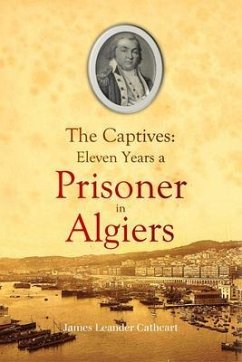"James Leander Cathcart (1767-1843), a seaman...was captured by Barbary pirates and imprisoned for 11 years in the 1780s in Algiers. Buying his freedom, he returned to the United States." -Arizona Daily Star, Dec. 1, 2002
"James Leander Cathcart...was captured on the Maria, made a fortune while still a slave and served as the ruling Dey's secretary." -Baltimore Sun, Oct. 9, 1966
"The first American hostages held by a Moslem country were captured by Algerian pirates in 1785...James Leandor Cathcart, a seaman aboard the Maria rose in time to become the Dey's chief clerk." -Chicago Tribune, Oct. 26, 1980
Taken prisoner by the Barbary Pirates, how did an indomitable spirit of patriotism enable Cathcart to rise from abject slavery to become Christian clerk to the Dey of Algiers, eventually gaining his freedom?
In 1785 Barbary pirates captured the American merchant ship The Maria Boston, on its way to Cadiz carrying furs, lumber, and dried codfish. They took Cathcart and twenty other sailors as slaves. During the eleven years of his slavery in Algiers Cathcart managed by means of good fortune, cleverness, and bribery to improve his circumstances, eventually becoming chief clerk to the Dey. In this position, he acted as a mediator between the Dey and Joseph Donaldson, Jr. agent for Colonel David Humphreys, the U.S. Minister to Portugal, that resulted in The Treaty of Algiers of 1796 and made possible his freedom.
Cathcart, for the first several years of his captivity, endured the same terrible living conditions as his fellow slaves. One of a few handpicked by the Dey, Cathcart's first duties were to work in the Dey's palace garden caring for the lions, tigers, and antelopes. Although his assigned duties were relatively light, his masters provided scant food and administered several beatings, called bastinado, where in one instance Cathcart lost several of his toenails.
In 1899, Cathcart's account of his captivity would be published posthumously under the title " The Captives: Eleven Years a Prisoner in Algiers," thanks to Cathcart's daughter who would put together his slave narrative and have it published 56 years after his death.
As his fortunes and positions in Algiers improved, Cathcart acquired additional skills that he used later as a diplomat. He found opportunities to demonstrate his concern for his fellow prisoners. During his slavery he became conversant in Arabic and Turkish. When Cathcart became clerk of the prison, he was able to buy several taverns, a house with servants, and procure more food for his fellow crew members. After the Treaty of Algiers freed them, Cathcart had the means to purchase a ship, which he sailed to Philadelphia in 1796 with twelve surviving members of the original crew.
He returned to the Barbary Coast in December 1798, as special agent to William Eaton. In 1802, he was appointed US Consul to Tunis and Tripoli. He participated in the negotiation of additional treaties with Algiers, Tunis, and Tripoli. He served as Consul-General for the United States in Cádiz from 1807-17, where he operated a merchant business with Richard Worsam Meade. Cathcart served in the diplomatic corps for the United States during the administrations of John Adams, Thomas Jefferson, and James Madison.
About the author:
James Leander Cathcart (1767 -1843) was a diplomat, slave, and sailor. He is notable for his narrative as a slave in Algiers for eleven years. He joined the American Revolution and at the age of twelve served on a privateer. Three years later, as a midshipman on The Confederacy, he was captured by the British and imprisoned on the prisoner ships, The Good Hope and Jersey from which he escaped in 1782.
"James Leander Cathcart...was captured on the Maria, made a fortune while still a slave and served as the ruling Dey's secretary." -Baltimore Sun, Oct. 9, 1966
"The first American hostages held by a Moslem country were captured by Algerian pirates in 1785...James Leandor Cathcart, a seaman aboard the Maria rose in time to become the Dey's chief clerk." -Chicago Tribune, Oct. 26, 1980
Taken prisoner by the Barbary Pirates, how did an indomitable spirit of patriotism enable Cathcart to rise from abject slavery to become Christian clerk to the Dey of Algiers, eventually gaining his freedom?
In 1785 Barbary pirates captured the American merchant ship The Maria Boston, on its way to Cadiz carrying furs, lumber, and dried codfish. They took Cathcart and twenty other sailors as slaves. During the eleven years of his slavery in Algiers Cathcart managed by means of good fortune, cleverness, and bribery to improve his circumstances, eventually becoming chief clerk to the Dey. In this position, he acted as a mediator between the Dey and Joseph Donaldson, Jr. agent for Colonel David Humphreys, the U.S. Minister to Portugal, that resulted in The Treaty of Algiers of 1796 and made possible his freedom.
Cathcart, for the first several years of his captivity, endured the same terrible living conditions as his fellow slaves. One of a few handpicked by the Dey, Cathcart's first duties were to work in the Dey's palace garden caring for the lions, tigers, and antelopes. Although his assigned duties were relatively light, his masters provided scant food and administered several beatings, called bastinado, where in one instance Cathcart lost several of his toenails.
In 1899, Cathcart's account of his captivity would be published posthumously under the title " The Captives: Eleven Years a Prisoner in Algiers," thanks to Cathcart's daughter who would put together his slave narrative and have it published 56 years after his death.
As his fortunes and positions in Algiers improved, Cathcart acquired additional skills that he used later as a diplomat. He found opportunities to demonstrate his concern for his fellow prisoners. During his slavery he became conversant in Arabic and Turkish. When Cathcart became clerk of the prison, he was able to buy several taverns, a house with servants, and procure more food for his fellow crew members. After the Treaty of Algiers freed them, Cathcart had the means to purchase a ship, which he sailed to Philadelphia in 1796 with twelve surviving members of the original crew.
He returned to the Barbary Coast in December 1798, as special agent to William Eaton. In 1802, he was appointed US Consul to Tunis and Tripoli. He participated in the negotiation of additional treaties with Algiers, Tunis, and Tripoli. He served as Consul-General for the United States in Cádiz from 1807-17, where he operated a merchant business with Richard Worsam Meade. Cathcart served in the diplomatic corps for the United States during the administrations of John Adams, Thomas Jefferson, and James Madison.
About the author:
James Leander Cathcart (1767 -1843) was a diplomat, slave, and sailor. He is notable for his narrative as a slave in Algiers for eleven years. He joined the American Revolution and at the age of twelve served on a privateer. Three years later, as a midshipman on The Confederacy, he was captured by the British and imprisoned on the prisoner ships, The Good Hope and Jersey from which he escaped in 1782.
Dieser Download kann aus rechtlichen Gründen nur mit Rechnungsadresse in A, D ausgeliefert werden.









